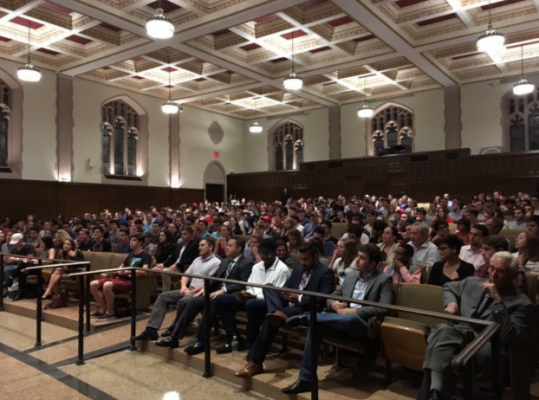Why I Brought Roger Stone to Campus
October 26, 2017
I’m not much of a partisan. I’m a registered Republican, but I voted for a Blue Dog Democrat for Congress and a Libertarian for President in 2016. I’m not much of a fan of President Trump. I don’t really revel in the idea of just provoking and triggering progressives. So why bring somebody as controversial as Roger Stone to campus? Because it’s novel, because Roger has a unique perspective and because it got people to come out.
Fordham has a very apathetic political culture. The College Democrat versus College Republican debates routinely get about 40 attendees at a school with over 8,800 undergrads. The two clubs together have nearly 100 members. A couple of years ago Steve Forbes came to Fordham, but only 50 people came to see him, and all were fans. Last year Charles Cooke of National Review came to campus, but only 80 people showed–again, all were fans. Aside from one angry march the night after the election, there wasn’t a real attempt at organization or protest.
As a dedicated political activist on campus, I feel as if it’s my duty to change the apathetic culture on campus.
When Roger Stone came to campus, more than 400 people came out. There were Trumpists and Socialists, Red-Caps and plain-old-reds, Black Lives Matter activists and backers of our boys and girls in blue and, of course, those who just wanted to see the spectacle firsthand. It was rowdy, it was heated, but most of all, it was energetic. I’ll admit that at points in the night, I had to shout at the crowd so that Mr. Stone would be able to continue speaking, but that’s just the price for a much greater victory. We provoked passions and brought energy to Fordham political life.
For days afterwards, I heard people talking about Roger Stone’s visit to campus. Many were disappointed that they missed out. Others said it was great that University President Rev. Joseph M. McShane, S.J., had let him on campus, especially after the incident with Ann Coulter from a few years back, and the school recently banning the Students For Justice in Palestine, an issue I’ve commented on before.
After that event, many students simply perceived the College Republicans as crazy or rude. I wanted something different with Roger Stone. Although I’ll admit that many were offended, there was a tremendous amount of passion in the Q&A section, where a great number of people talked about Stone’s controversial past statements and tweets. By bringing Stone to campus, we gave opponents of Trump a conduit to express their views towards one of the President’s most high-profile supporters. We turned an internal discussion within anti-Trump communities into an outward manifestation of political passion.
It’s not breaking news that politics can be an offensive topic. If you believe in politics as a clash of ideals and fundamental values that you hold dear, then of course somebody is going to be offended. Trump regularly offends many people’s sensibilities. Similarly, Mayor DeBlasio offends me when he talks about how much he hates private property. Hillary Clinton offends me when she fails to admit her election failures and instead blames others such as Bernie Sanders or President Obama. I’d still happily come by and see any of them if they came to my campus. In fact, I’d be happy to help set things up for them. One person’s right to expression doesn’t end where another person’s feelings begin.
I’d like to thank the Fordham University College Republicans for working with the College Libertarians to bring Stone to campus. I’m sure the ridiculous United Student Government investigation against the College Republicans’ effort to secure funds to pay for Stone will end in favor of the College Republicans. I’d also like to thank Stone for taking the time out to come speak at Fordham.
I’d like to thank Father McShane for allowing the event to take place and for the generous promotional efforts he gave us when he issued the university statement on Stone coming to campus. His statement was a tremendous contribution to the evening’s success. In his statement he said that “If we err in this decision, we do so on the side of academic freedom” and “No point of view has the exclusive right to freedom of speech, and I encourage you all to use that right freely and wisely.” These are the liberal, as in liberal arts, values that make the country great.
As for the future, just wait to see who we bring to Fordham next.














S • Oct 26, 2017 at 6:49 pm
Not true about Cooke. Most didn’t know him and several members of the College Dems attended and questioned him.